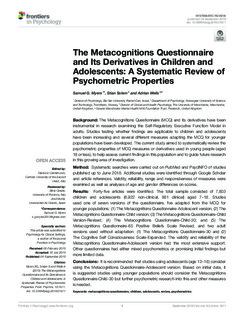| dc.contributor.author | Myers, Samuel G | |
| dc.contributor.author | Solem, Stian | |
| dc.contributor.author | Wells, Adrian | |
| dc.date.accessioned | 2019-09-05T11:59:23Z | |
| dc.date.available | 2019-09-05T11:59:23Z | |
| dc.date.created | 2019-09-04T09:11:32Z | |
| dc.date.issued | 2019 | |
| dc.identifier.citation | Frontiers in Psychology. 2019 | nb_NO |
| dc.identifier.issn | 1664-1078 | |
| dc.identifier.uri | http://hdl.handle.net/11250/2612672 | |
| dc.description.abstract | Background: The Metacognitions Questionnaire (MCQ) and its derivatives have been instrumental in research examining the Self-Regulatory Executive Function Model in adults. Studies testing whether findings are applicable to children and adolescents have been increasing and several different measures adapting the MCQ for younger populations have been developed. The current study aimed to systematically review the psychometric properties of MCQ measures or derivatives used in young people (aged 18 or less), to help assess current findings in this population and to guide future research in this growing area of investigation.
Method: Systematic searches were carried out on PubMed and PsycINFO of studies published up to June 2018. Additional studies were identified through Google Scholar and article references. Validity, reliability, range and responsiveness of measures were examined as well as analyses of age and gender differences on scores.
Results: Forty-five articles were identified. The total sample consisted of 7,803 children and adolescents (6,922 non-clinical, 881 clinical) aged 7–18. Studies used one of seven versions of the questionnaire, five adapted from the MCQ for younger populations: (1) The Metacognitions Questionnaire-Adolescent version; (2) The Metacognitions Questionnaire-Child version; (3) The Metacognitions Questionnaire-Child Version-Revised; (4) The Metacognitions Questionnaire-Child-30; and (5) The Metacognitions Questionnaire-65 Positive Beliefs Scale Revised; and two adult versions used without adaptation: (1) The Metacognitions Questionnaire-30 and (2) The Cognitive Self Consciousness Scale-Expanded. The validity and reliability of the Metacognitions Questionnaire-Adolescent version had the most extensive support. Other questionnaires had either mixed psychometrics or promising initial findings but more limited data.
Conclusions: It is recommended that studies using adolescents (age 12–18) consider using the Metacognitions Questionnaire-Adolescent version. Based on initial data, it is suggested studies using younger populations should consider the Metacognitions Questionnaire-Child-30 but further psychometric research into this and other measures is needed. | nb_NO |
| dc.language.iso | eng | nb_NO |
| dc.publisher | Frontiers Media | nb_NO |
| dc.rights | Navngivelse 4.0 Internasjonal | * |
| dc.rights.uri | http://creativecommons.org/licenses/by/4.0/deed.no | * |
| dc.title | The Metacognitions Questionnaire and Its Derivatives in Children and Adolescents: A Systematic Review of Psychometric Properties | nb_NO |
| dc.type | Journal article | nb_NO |
| dc.type | Peer reviewed | nb_NO |
| dc.description.version | publishedVersion | nb_NO |
| dc.source.journal | Frontiers in Psychology | nb_NO |
| dc.identifier.doi | https://doi.org/10.3389/fpsyg.2019.01871 | |
| dc.identifier.cristin | 1721311 | |
| dc.description.localcode | Copyright © 2019 Myers, Solem and Wells. This is an open-access article distributed under the terms of the Creative Commons Attribution License (CC BY). The use, distribution or reproduction in other forums is permitted, provided the original author(s) and the copyright owner(s) are credited and that the original publication in this journal is cited, in accordance with accepted academic practice. No use, distribution or reproduction is permitted which does not comply with these terms. | nb_NO |
| cristin.unitcode | 194,67,40,0 | |
| cristin.unitname | Institutt for psykologi | |
| cristin.ispublished | true | |
| cristin.fulltext | original | |
| cristin.qualitycode | 2 | |

